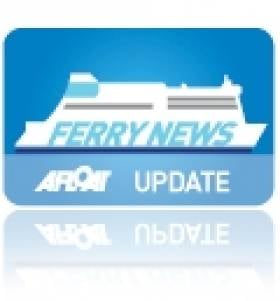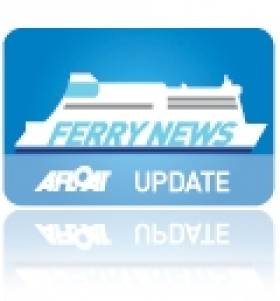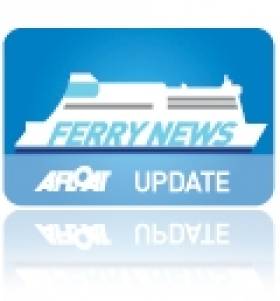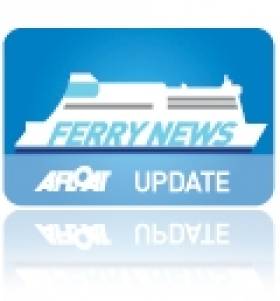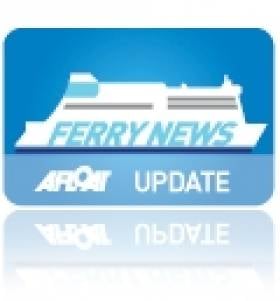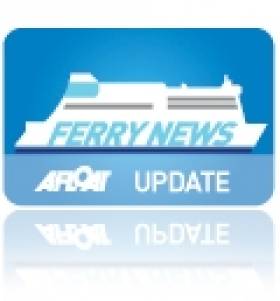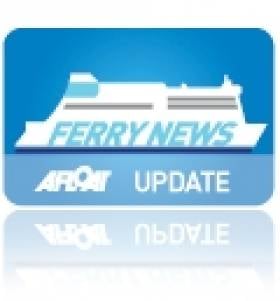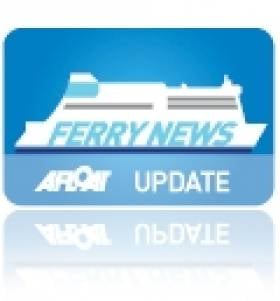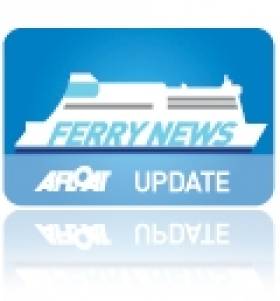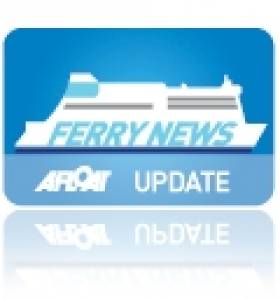Displaying items by tag: Irish Ferries
French Route Ferry Expected to Re-Enter Service Today
#FerryReturns – Irish Ferries French route cruiseferry, Oscar Wilde, which had to cancel sailings due to a technical fault involving the radar, is expected to resume service with today's night-time sailing departing from Cherbourg to Rosslare.
As previously reported, the cruiseferry Oscar Wilde (1987/31,914 tonnes), was due to have departed Cherbourg on Tuesday, however she has remained since then in the French port. As a result this also led to the cancellation of a round trip crossing from Ireland which was scheduled to arrive to Cherbourg this afternoon.
Tonight's sailing from Cherbourg is scheduled to depart at 21.30 local time and arrive in Rosslare Harbour tomorrow afternoon at 15.30hrs. For the latest information on sailings updates and contact details from ports, visit this link from Irish Ferries website.
Passengers Delayed in France after Ferry Technical Fault
#FerryFault- RTE News reports that passengers numbering around 1,000 had to spend the night on board an Irish Ferries vessel in the French port of Cherbourg after the crossing to Rosslare was cancelled.
Tonight's sailing from Rosslare to Cherbourg has also been cancelled. The 1987 built cruiseferry Oscar Wilde of 31,914 tonnes, was due to leave the French port at 8pm yesterday evening, but a fault with its radar system meant the journey could not go ahead.
An Irish Ferries spokesperson said that a ship may be able to get permission to sail in these circumstances provided there are good weather conditions, but the port of Cherbourg was enveloped in fog at the time.
All passengers on-board the ferry in Cherbourg, have now disembarked and alternative travel is being arranged for them.
An Irish Ferries spokesperson said that the nature of the technical problem necessitated the use of an expert technician and it would not be possible to have the ferry sail today.
For the latest information on sailings updates and contact details from ports, visit this link from Irish Ferries website.
St. Patrick’s ‘Shamrock’ Symbol Still Sails Strong
#StPatricksShamrock – In addition to Celtic Link Ferries Cherbourg-Rosslare route ferry Celtic Horizon arrival to the Wexford port this St. Patrick's Day, Irish Ferries new service from the same Normandy port saw Epsilon dock in Dublin Port, writes Jehan Ashmore.
As previously reported this was Celtic Link's final St. Patrick's Day promotional sailing before the operator is taken over by Stena Line at the end of the month and contrasts to Irish Ferries first sailing on this national day on the direct continental service.
The Dublin-Cherbourg route is the third Ireland-France route option to compliment Irish Ferries established Rosslare routes to Cherbourg and Roscoff. Last year, the company celebrated 40 years of direct continental operations, having started in 1973 firstly between Rosslare and Le Havre.
At that time, the route was operated by Irish Continental Line, part of the state-owned Irish Shipping Ltd, which was inaugurated by the brand new Saint Patrick. She sported a white 'shamrock' painted on a green funnel to reflect the routes ownership origins and marketing to a continental audience.
This symbolic symbol of Ireland was given further coverage when Saint Patrick II made a special publicity cruise in Dublin Bay as part of the 'postcard' videos during the 1994 EuroVision Song Contest held at the Point Depot and the contest's hosting of interval act 'Riverdance'.
Since then the use of the shamrock has been increasingly involved to market the island of Ireland overseas by Aer Lingus and more so on a global stage by Tourism Ireland. As such the shamrock represents an easily recognisable symbol and remains on the ferry company successor, Irish Ferries, whose parent company is the Irish Continental Group.
Both Celtic Link's 2006 built Celtic Horizon and Irish Ferries 2011 built Epsilon (recently renamed) are chartered Visentini built ro-pax ferries of the same design and fitted out with a limited range of passenger facilities.
However, following the pending demise of Celtic Link Ferries with the entry of newcomer Stena Line on the direct continental service, an historic first for the company, this is no doubt to lead to new corporate colours and introduction of the Stena passenger experience.
What’s in a Re-Naming, Irish Ferries Newcomer ‘Epsilon’
#NameEPSILON - Irish Ferries chartered newcomer Cartour Epsilon introduced in late 2012 firstly on Dublin-Holyhead service and in January launching a new Dublin-Cherbourg route has been renamed, writes Jehan Ashmore.
The renaming albeit shortened to 'Epsilon' took place late last month and is a move away by Irish Ferries from the naming theme derived from previous Italian operator, Caronte & Tourist. They operate a pair of Visentini-built sisters, 'Cartour' Gamma / Delta from Salerno to the Sicilian port of Messina.
As Epsilon is chartered she continues to fly the Italian flag and port of registry of Bari on the Adriatic Sea from where the Visentini shipyard near Venice launched her as Akerman Street. It is understood she ran initially for Epic Shipping Ltd and Visemar before her last role off the 'boot' of Italy.
Irish Ferries new entrant has a 500-passenger capacity and facilities are a restaurant, bar/lounge, shop kiosk, free Wi-Fi and en-suite cabins accommodating 2 and 4-berth cabins all equipped with T.V.
Overall facilities are limited and as such the new Ireland-France route is been advertised as an alternative 'economy' service.
Irish Ferries continue to operate the family-friendly cruiseferry Oscar Wilde on the established Rosslare-Cherbourg route that reopened last month and a seasonal service to Roscoff.
Epsilon brings a capacity boost to the Dublin-Holyhead route as Irish Ferries will undertake 5,000 sailings to the UK (up from 4,122 in 2013) and this includes Rosslare-Pembroke Dock services.
In addition to 380 continental crossings on the Dublin-Cherbourg route which is an increase of 259 sailings on last year.
Irish Ferries Higher Profits Set Positive Course for 2014
#FerryResults - Commenting on the Irish Continental Groups' preliminary statement of results for year end of 31 December 2013, the group's Chairman John B McGuckian commented,''2013 was a successful year for the Group with a solid financial and operational performance in a competitive passenger and freight market place. The improving economic outlook in Ireland has encouraged us in our recently announced investment in the charter of an additional vessel, the Epsilon, which has been trading since mid-December."
Mr. McGuckian added, "RoRo freight volumes are up 18% year on year, to date, despite adverse weather conditions which have led to cancelled sailings."
Below are extracts from the preliminary results, which focus on the operating review of the Irish Ferries division:
Revenue in the division was 1.1% higher than the previous year at €161.7 million while operating profit (before non-trading items) was €24.9 million compared with €22.4 million in 2012.
The increase in profit was due principally to increased freight revenue and lower bunker (fuel) costs partially offset by reduced passenger revenue.
Fuel cost in the division was down €3.5 million (8.9%) to €35.8 million. Revenue in the first half of the year was flat at €69.4 million (2012: €69.5 million), while the second half saw an increase of 2.0%, to €92.3 million (2012: €90.5 million).
Passenger: Given the weak economic backdrop in our main markets, which affects consumers' propensity to travel, Irish Ferries' car carryings remained resilient during the year, at 350,900 cars, (2012: 353,800), down slightly (0.8%) on the previous year.
This is broadly in line with the overall market performance into and out of the Republic of Ireland, which we estimate to have been flat year on year. Irish Ferries' passenger numbers carried were up 1.6% at 1.568 million (2012: 1.544 million).
In the first half of the year, our passenger volumes were up by 0.3% and car volumes were down by 4.2%. In the second half of the year, which is seasonally more significant, the growth in passenger numbers was 2.6% while cars carried were up by 1.6% compared with the same period last year. During 2013 sterling was weaker than in the previous year which provided a headwind in our passenger segment.
Our business benefited from the start of a recovery in demand in the British market for Ireland's Tourism product where overall visitor numbers grew slightly following four years of serious decline. Britain continues to provide the largest proportion of passenger traffic for Irish Ferries amongst all of the countries where we source income and the continuation of Ireland's attractiveness in that market is critical to our future growth.
Freight: The Republic of Ireland's RoRo market returned to growth with a 3% increase in overall market carryings during the first half of the year followed by a 6% increase in the second half, to provide full year growth of 4%. This is a welcome sign of Ireland's return to improved economic health.
Irish Ferries' carryings, at 205,300 freight units (2012: 183,700), were up 11.8% in the year reflecting a strong performance by Irish Ferries relative to the market (volumes were up 7.9% in the first half and 15.7% in the second half).
The improvement in the RoRo markets informed our decision in the final quarter of 2013 to augment our capacity on the Dublin / Holyhead route whilst also commencing a new service between Dublin and Cherbourg.
The chartered vessel Epsilon will provide a major improvement in our frequency on Dublin / Holyhead which we believe will restore some lost competitive advantage. With the vessel's superior freight deck and the number of cabins on board (70), we will also provide a once weekly service to France which will provide additional capacity to our customers throughout the year – much of which we are unable to provide because of the freight deck limitations of the cruise ferry Oscar Wilde (which is a more passenger-oriented vessel). It will also broaden our tourist offering by providing an economy style service to France complementing the Oscar Wilde.
This investment in both the Dublin / Holyhead and Dublin / Cherbourg routes will increase the Ferries' Division cost base but the initiative is targeted to become profitable within a short number of years.
Charter: The MV Kaitaki remained on charter during the year, trading in New Zealand. The charter to P&O terminated on 30 June 2013 following which a new charter commenced, on 1 July 2013, to KiwiRail. The new charter is for a period of 4 years with an option for the charterer to extend the agreement by a further 3 years, out to 2020.
The Princess Anastasia (formerly 'Bilbao') remained on bareboat hire purchase charter to St. Peter Line. Under the terms of the charter party, (forming part of the hire purchase sale agreement), title to the vessel will transfer to the charterers, on payment of the remaining instalments due under the agreement.
To read further information of the results including freight Lo-Lo performance figures, they can be downloaded in full from this link.
#FrenchBoost- Cruiseferry, Oscar Wilde opened the 2014 season of Irish Ferries established Rosslare-Cherbourg route at the weekend, giving a boost in services, following the launch of the new Dublin Port-Cherbourg route last month, writes Jehan Ashmore.
During this off-peak period, the Oscar Wilde had operated winter relief cover on the Rosslare-Pembroke Dock link. As previously reported on Afloat.ie, she also went to A&P Falmouth, from where she recently returned fresh from annual refit so also to serve high-season Rosslare-Roscoff sailings in May.
With Oscar Wilde off-duty then on the French service, Irish Ferries were still able to maintain services to the continent on the new route between the capital and Cherbourg which is operated year-round by the chartered 500-passenger ro-pax Cartour Epsilon.
The 19-hour route is marketed as an 'economy' style alternative to the broader facilities offered by cruiseferry Oscar Wilde on the 17-hour service to Normandy.
It has not been plain sailing for the newcomer, as Cartour Epsilon, encountered a spate of storms, which on occasions led to sailings delayed by a day. This in turn led to some Dublin-Holyhead sailings cancelled, noting the ferry operates daily sailings to Wales and leaving the weekend to cover continental crossings.
In addition, on the initial sailings including her maiden round-trip voyage, the Cartour Epsilon which is designed primarily to carry freight made a scheduled en-route call to Rosslare Harbour, having loaded trade vehicles in Cherbourg before finally completing her return leg to Dublin Port.
Cartour Epsilon's calls to Rosslare are not new, as previously reported, she carried out Rosslare-Cherbourg sailings earlier this year so that Oscar Wilde as mentioned above could in turn carry out relief cover for Isle of Inishmore on the Wexford-Pembrokeshire service.
In fact, the ro-pax made her first ever Irish port of call debut to Rosslare Harbour during her delivery voyage from Messina, Sicily. Likewise to her French debut, trade-vehicles were transported, making sure she was earning her keep while making that repositioning voyage to Dublin Port.
A Ferry-Tale of Two Isles
#FerryIsles – Two ferries one serving on the Irish Sea, the other running a link to a Scottish island, were until yesterday undergoing refit together at Cammell Laird shiprepair facility in Birkenhead, writes Jehan Ashmore.
Isle of Inishmore (1997/34,031grt) Irish Ferries Rosslare-Pembroke Dock ferry departed Merseyside following her annual maintenance in dry-dock No. 5. She returned to the Pembrokeshire link displacing Oscar Wilde, the French routes cruiseferry which is heading for A&P Falmouth drydock for work to prepare her prior to launching the season later this month.
Meanwhile, Isle of Lewis (1995/6,753grt) Caledonian MacBrayne's Ullapool-Stornoway route ferry is also receiving refit in Birkenhead dry dock No. 6. The Outer Hebrides route vessel is to be replaced by a newbuild which is currently under construction at FGS shipyard in Flensberg, Germany.
Irish Ferries fast-craft Jonathan Swift is also a recent caller to the Wirral Peninsula dockyard having followed flagship Ulysses which had taken her turn for overhaul too.
Irish Ferries Voted Best Ferry Company for Fourth Year in a Row
#ferries – Irish Ferries has been voted Ireland's Best Ferry Company for the fourth year in succession at the Irish Travel Industry Awards held in Dublin recently.
The award was bestowed on the company by a vote of Irish travel agents and comes in the week when the company launched its new weekend direct return service between Dublin and the French port of Cherbourg.
Providing what the company's head of passenger sales Dermot Merrigan said is 'a third route option that augments the company's existing services from Rosslare to Cherbourg and Roscoff', the new 19-hours service is operated by the ferry vessel Epsilon departing Dublin every Saturday afternoon and arriving Cherbourg the following morning. Sailings return later each Sunday in time to arrive back in Ireland on Monday morning.
Winter Launch of New Continental Routes to Heat-Up Competition
#FerryFrance – It may only be the first month of 2014, yet two new direct Ireland-France ferry routes are launched. Irish Ferries Dublin-Cherbourg route which opens today and LD Lines Rosslare-St. Nazaire-Gijon (Spain) services which began last weekend, writes Jehan Ashmore.
Irish Ferries new 19-hour route connecting the capital and the continent is served by the 500 passenger ro-pax ferry, Cartour Epsilon.
The same ferry design from the shipyard of Visentini also applies to the Scintu, that launched the LD Lines service. She departed Rosslare yesterday on her second call to the port as the renamed Norman Atlantic, to reflect her Irish-Iberian 'landbridge' route role.
Never before has there been so much choice in services between Ireland and France with five routes served by four operators. This increased level of competition can only be good news for passenger customers and freight hauliers.
In addition to Irish Ferries new route, the ferry firm also operates the cruiseferry, Oscar Wilde on the established routes of Rosslare-Cherbourg, reopening late February and a high-season service to Roscoff.
Rosslare port is also home to Celtic Link Ferries operations on the Cherbourg route served by another Visentini built ro-pax, Celtic Horizon.
Final player on the Ireland-France market, Brittany Ferries run the Cork-Roscoff service which is to resume in mid-March with crossings carried out by flagship Pont-Aven.
#ferry – This weekend (Saturday, 18th January 2014), Irish Ferries will inaugurate its new direct weekend car ferry service between Dublin and the French port of Cherbourg. As previously reported, the new 19-hours service will be operated by the passenger car and freight ferry vessel Epsilon which the company acquired recently under a charter arrangement. Sailings will depart from the Ferryport terminal in Dublin at 15.30 hrs on Saturday and will arrive in Cherbourg at 11.30hrs on Sunday morning. It will return to Dublin later that day, departing Cherbourg at 17.00hrs arriving back in Ireland on Monday morning.
Third Route Option
The introduction of the new Dublin to Cherbourg service gives holidaymakers travelling into and out of Ireland a third route option, augmenting, as it does, the company's services from Rosslare to Cherbourg and Rosslare to Roscoff. Timed to arrive in Cherbourg early enough to facilitate easy onward travel to campsites and holiday centres throughout France, the new service is expected to prove popular with families and hauliers alike.
On board Epsilon, the once-weekly, year round service will offer a more limited range of cabins and passenger attractions when compared with those on board the company's cruise ferry Oscar Wilde which will continue to service routes from Rosslare to Cherbourg and Roscoff as before.
Bringing access to European motorways into the heart of Dublin city, the new service will extend the appeal of a motoring holiday in France to an even wider market. For those living in the northern half of the country, it eliminates driving to Rosslare and cuts the motoring time and cost involved.
MV Epsilon
Built in 2011, the Epsilon has capacity for 500 passengers. Modest facilities on board include a bar, cafeteria, self-service restaurant, 68 two and four berth cabins all with TV, free wi-fi service and 2,860 lane metres of vehicle deck parking space. Commenting Irish Ferries head of passenger sales, Dermot Merrigan said 'our new Dublin to Cherbourg direct service will appeal to those living within and beyond our capital city. Fast access straight through the city or from the Dublin Port Tunnel ensures that our new Ireland – France service will be more accessible to all.'
Fares and offers for this new Dublin to Cherbourg service can be viewed on the Irish Ferries website www.irishferries.com . When not operating on the Dublin to Cherbourg service, Epsilon will sail between Dublin and Holyhead increasing Irish Ferries services on the route to a maximum of twelve sailings each day.


























